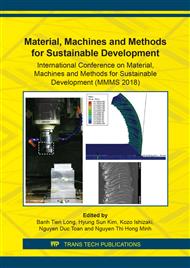p.211
p.216
p.223
p.231
p.244
p.254
p.266
p.275
p.283
A Study on Reasonable Ratios of Vegetable Oils and Diesel Oil in Mixed Fuel Used as an Alternative Fuel for Marine Diesel Engines in Vietnam
Abstract:
Vegetable oil is used directly as a fuel, in either modified or unmodified equipment, it is referred to as straight vegetable oil (SVO). SVOs have some advantages in comparison with fossil fuel oils such as: renewability, local availability, lower sulfur content, etc. avoiding the environmental effects caused by sulfuric acid, lower aromatic content and high biodegradability. However, SVOs are also attached to several disadvantages such as: high viscosity, low heating value, high fatty contents, influencing on injection process and causing engine coking if misused. In order to prevent such negative effects of diesel engine fuelled by SVO, one of potential solutions is using blends of SVO with diesel oil (DO). In such case, the reasonable ratio of SVO and diesel oil plays a very important role for normal running condition, but also seems to be challenge to identify. The article shows results of a study on defining the ratio for marine diesel application. It is firstly based on the assessment on the heat release processes inside the diesel engine cylinder upon a specific simulation with different blends of SVO and diesel oil. In comparison with the particular requirements for fuel of marine engines, the preferable percentage of vegetable oil in the fuel mixture is pointed out. And finally, the experiments with fuel system of a typical marine diesel engine, HANSHIN 6LU32, installed at the lab of Vietnam Maritime University in terms of checking real engine’s operation and reducing harmful emissions.
Info:
Periodical:
Pages:
244-253
DOI:
Citation:
Online since:
March 2019
Authors:
Keywords:
Price:
Сopyright:
© 2019 Trans Tech Publications Ltd. All Rights Reserved
Share:
Citation:


